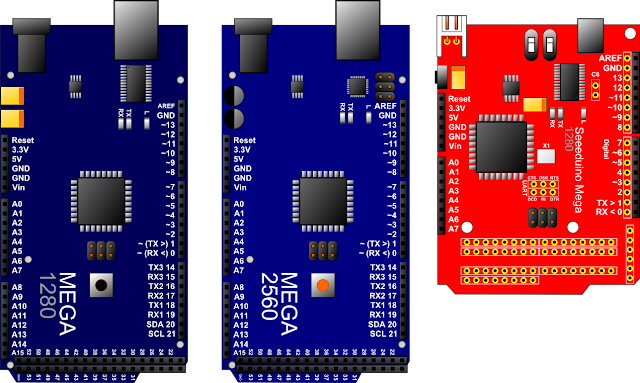I have been working on some important new blocks before the Beta release. Here are some of them (another post with more blocks soon!). I know, someone can think that this is complex, but there are good news: a teacher or any other user who wants to simplify the GUI, can configure Minibloq to load only some blocks (I will write more on this with the Beta documentation):
Another new feature is a better organization subsystem for the blocks. The last row, for example, now contains the special sensors blocks. Although in Minibloq it's possible to read a sensor with the AnalogRead standard block, now there are some special sensor blocks, like Seeedstudio's ultrasonic ranger. I'm working with different manufacturers to add more sensors soon.
miniBloq is an open source graphical programming environment for Multiplo™, Arduino™, physical computing devices and robots.
Tuesday, September 27, 2011
Monday, September 19, 2011
Mega boards added!
Three new important boards has been added:
Arduino™ Mega 2560
Arduino™ Mega (ATmega1280)
Seeeduino Mega
They will be included in the (coming soon) Minibloq.v0.8.Beta:
Arduino™ Mega 2560
Arduino™ Mega (ATmega1280)
Seeeduino Mega
They will be included in the (coming soon) Minibloq.v0.8.Beta:
Sunday, September 18, 2011
Open source robotics activity pads!
We have designed 3 activity pads at RGLabs, and RobotGroup has released them. I want to share the links here because they may be useful to Minibloqers. Those pads belongs to the Multiplo project, which is an open source robotics platform under constant development.
The pads has been designed using Inkscape, an Open source SVG graphics editor and there are 3 of them: The one shown here allows to do general activities, like line-following, etc.. There is also a sumo pad and a millimetrical grid. The 3 were designed to be printed with a standard plotter. You can download the PNG version (just to go and print) or the SVGs (which in this case are "the sources"). You can download them this GitHub link.
Enjoy!
The pads has been designed using Inkscape, an Open source SVG graphics editor and there are 3 of them: The one shown here allows to do general activities, like line-following, etc.. There is also a sumo pad and a millimetrical grid. The 3 were designed to be printed with a standard plotter. You can download the PNG version (just to go and print) or the SVGs (which in this case are "the sources"). You can download them this GitHub link.
Enjoy!
Tuesday, September 13, 2011
Maple 32 bits board is here!
We are having a lot of activity in the project these days. Since the v0.8.Alpha was sent to backers and alpha testers we got a lot of feedback, and we are now working hard to release the Beta. One of the Beta's biggest improvements will be the ability to work with a lot of boards. Most of them will be Arduino-compatible boards, with 8-bit AVR microcontrollers. But this week we added a very different board to the list of supported hardware: The Maple (32-bits!) from LeafLabs. It features an ARM Cortex M3 processor running at 72 MHz. Although the multiboard subsystem is still a work in progress, this shows clearly Minibloq's capacity to deal with different hardware and backend compilers.
Wednesday, September 7, 2011
Minibloq at the Universidad de Buenos Aires
Minibloq is being tested on a postgraduate course on physical computing and robotics at the Facultad de Arquitectura, Diseño y Urbanismo de la Universidad de Buenos Aires. Using equipment provided by RobotGroup, this course belongs to the BIME, a postgraduate career on design and mechatronics:
Tuesday, September 6, 2011
Hardware for primary schools and Minibloq
Multiplo equipment produced by RobotGroup, is being used by the Universidad Tecnológica Nacional - Facultad Reginal Buenos Aires, for a project called KimTech. Minibloq is the software selected for the project. Here is a small (initial) video showing one of the possible models that can be constructed to teach automation in primary schools (you can see more videos here):
Monday, September 5, 2011
Small video about Minibloq.v0.8.Alpha's variables
As promised in a previous post, here we have another small video with features belonging to the last Minibloq version (v0.8.Alpha). This time it shows quickly the real time error-checking in the variables subsystem:
Sunday, September 4, 2011
First approach to run Minibloq under OS X
Ulises Mendoza, from Spain, has been working on a Wineskin wrapper for Minibloq. Thanks Ulises! Here is a screenshoot:
This wrapper was sent to backers and alpha testers today. I hope to have it working fine for the Beta release...
I'm also working on the project's Documentation page these days, so you will find there instructions to run Minibloq in Ubuntu and in the OLPC XO, among other things.
This wrapper was sent to backers and alpha testers today. I hope to have it working fine for the Beta release...
I'm also working on the project's Documentation page these days, so you will find there instructions to run Minibloq in Ubuntu and in the OLPC XO, among other things.
Subscribe to:
Posts (Atom)





